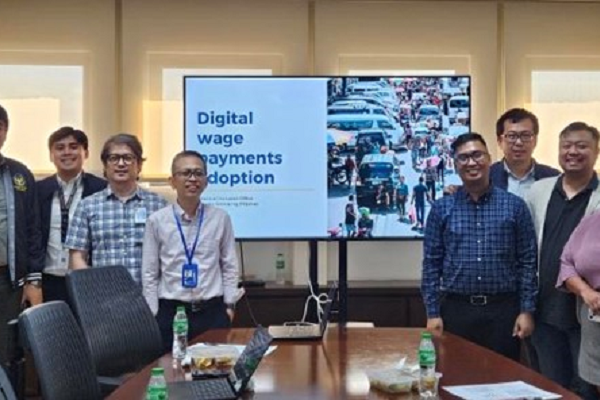Contact us: digitalwages@ilo.org
Sustaining the advancement of responsible digital wage payments with Philippine government agencies

The ILO’s Global Centre on Digital Wages for Decent Work continues its engagement of Philippine national government agencies – the Bangko Sentral ng Pilipinas (BSP, the Philippine central bank), the Department of Trade and Industry (DTI), and the Department of Labor and Employment (DOLE) – to accelerate the adoption of responsible digital wage payments among enterprises and workers in the country.
In April 2024, the BSP’s Financial Inclusion Office (FIO) invited the Global Centre and the Employers Confederation of the Philippines (ECOP) to a technical meeting to discuss the results of their study on digital wage payments adoption, conducted in late 2023, and explore opportunities for collaboration in the coming months to scale up the transition.
Using the Global Centre’s set of criteria in implementing responsible digital wage payments, the BSP-FIO study revealed that the factors that hinder MSMEs’ adoption of digital wage payments include: lack of or limited business or organizational capacity; perceived high costs of opening and maintaining payroll accounts; perceived weak internal demand among employees; inaccessibililty of banks, ATMs and cash-out points; and different preferences of employers and employees.
The conditions that could enable enterprises to adopt digital wage payments include: the protection against fraud, misuse and insolvency; the capacity of enterprises for responsible digital wage payments; and the suitability of digital payment solutions to the needs of employers. The respondents to the study also highlighted safety and security, process streamlining, reduced transaction costs and the timeliness as advantages that come with wage digitization. At the same time, they pointed out that the stringent payroll requirements of banks and the learning curve in implementing digital wage payments are among their transition pains.
During the discussion, the Global Centre noted the value of the BSP-FIO study in gathering further evidence on the experience of Philippine enterprises in transitioning from cash to digital wages. The ECOP representatives, joined by two of the trainers who participated in the Global Centre’s training programme fortrainers on responsible wage digitization in October 2023, shared the challenges they encountered while digitizing wages, such as limited availability of information from banks on payroll products, cybersecurity concerns and intermittent broadband connectivity in some areas. Both the ILO and ECOP suggested possible ways to facilitate greater adoption of responsible digital wage payments among local enterprises, including intensified digital and financial literacy campaigns, reduction of account maintenance and transaction fees and enhanced consumer protection.
The BSP welcomed the comments and feedback from the ILO and ECOP and gave reassurance to take these into consideration as the agency continues its efforts to advance digital payments for borader financial inclusion in the Philippines, including through digital wage payments.
Also in April 2024, the DTI’s Bureau of Small and Medium Enterprise Development welcomed the Global Centre’s comments on the Philippine government’s MSME digitalization agenda, which is currently being formulated. This follows the workshop on the same subject in November 2023, wherein the Global Centre also participated and provided inputs. Among others, the comments aim to ensure the inclusion of responsible wage digitization as an essential element of MSME digitalization and the participation of key stakeholders from government, employers, and workers sectors in the pursuit of the agenda’s strategic goals.
In May 2024, the DOLE’s Bureau of Working Conditions (BWC) invited the Global Centre to speak about responsible digital wage payments in its “Webinar Wednesdays” online series. The BWC’s “Webinar Wednesdays” is livestreamed via its Facebook page in coordination with DOLE’s regional and provincial offices and is regularly viewed by a large audience across the Philippines.
During the webinar, the Global Centre highlighted the features of responsible digital wage payments, the benefits for enterprises and workers, the challenges in the country that hinder faster adoption and ways forward, such as social dialogue, to help employers and employees to transition in a responsible manner. In the open forum at the end of the webinar, viewers asked questions related to the security of wages, opening of financial accounts, protection against cyber fraud and how workers can convince their employers to pay them digitally.
In the coming months, the Global Centre will continue its collaboration with the BSP, DTI, and DOLE on various activities that advance broader financial inclusion, MSME digitalization, and workers empowerment in the Philippines.
